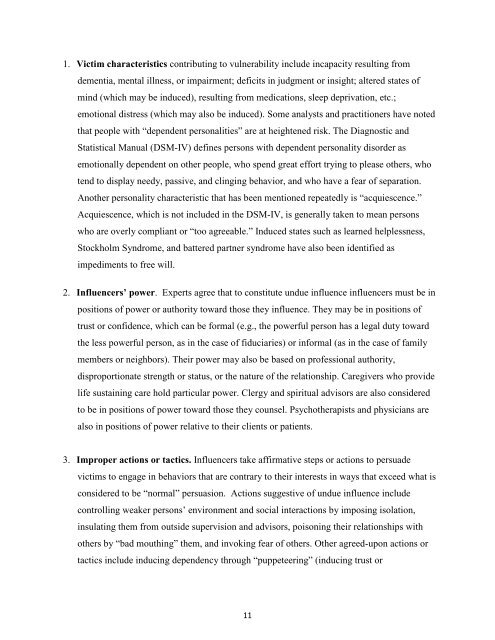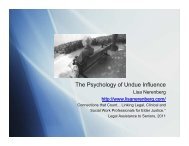Undue Influence: Definitions and Applications - California Courts ...
Undue Influence: Definitions and Applications - California Courts ...
Undue Influence: Definitions and Applications - California Courts ...
Create successful ePaper yourself
Turn your PDF publications into a flip-book with our unique Google optimized e-Paper software.
1. Victim characteristics contributing to vulnerability include incapacity resulting from<br />
dementia, mental illness, or impairment; deficits in judgment or insight; altered states of<br />
mind (which may be induced), resulting from medications, sleep deprivation, etc.;<br />
emotional distress (which may also be induced). Some analysts <strong>and</strong> practitioners have noted<br />
that people with “dependent personalities” are at heightened risk. The Diagnostic <strong>and</strong><br />
Statistical Manual (DSM-IV) defines persons with dependent personality disorder as<br />
emotionally dependent on other people, who spend great effort trying to please others, who<br />
tend to display needy, passive, <strong>and</strong> clinging behavior, <strong>and</strong> who have a fear of separation.<br />
Another personality characteristic that has been mentioned repeatedly is “acquiescence.”<br />
Acquiescence, which is not included in the DSM-IV, is generally taken to mean persons<br />
who are overly compliant or “too agreeable.” Induced states such as learned helplessness,<br />
Stockholm Syndrome, <strong>and</strong> battered partner syndrome have also been identified as<br />
impediments to free will.<br />
2. <strong>Influence</strong>rs’ power. Experts agree that to constitute undue influence influencers must be in<br />
positions of power or authority toward those they influence. They may be in positions of<br />
trust or confidence, which can be formal (e.g., the powerful person has a legal duty toward<br />
the less powerful person, as in the case of fiduciaries) or informal (as in the case of family<br />
members or neighbors). Their power may also be based on professional authority,<br />
disproportionate strength or status, or the nature of the relationship. Caregivers who provide<br />
life sustaining care hold particular power. Clergy <strong>and</strong> spiritual advisors are also considered<br />
to be in positions of power toward those they counsel. Psychotherapists <strong>and</strong> physicians are<br />
also in positions of power relative to their clients or patients.<br />
3. Improper actions or tactics. <strong>Influence</strong>rs take affirmative steps or actions to persuade<br />
victims to engage in behaviors that are contrary to their interests in ways that exceed what is<br />
considered to be “normal” persuasion. Actions suggestive of undue influence include<br />
controlling weaker persons’ environment <strong>and</strong> social interactions by imposing isolation,<br />
insulating them from outside supervision <strong>and</strong> advisors, poisoning their relationships with<br />
others by “bad mouthing” them, <strong>and</strong> invoking fear of others. Other agreed-upon actions or<br />
tactics include inducing dependency through “puppeteering” (inducing trust or<br />
11




